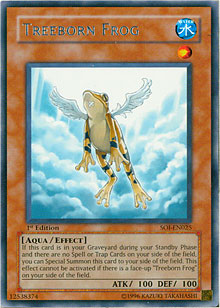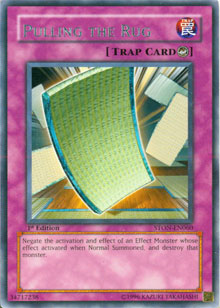One of the biggest problems that many players face in their quest for stardom is overcoming their own emotions in the heat of battle. Getting too excited or too discouraged in the middle of a match leads to misplays, and misplays lead to losses. In this feature, I want to provide everyone out there at home with something of a checklist of things you want to keep track of during a game, especially before or after a move is made. Each of these things is something that players today have had trouble with due to becoming overly excited, discouraged, desperate, or cocky.
Check Life Points, ATK points, DEF points
 If you have a move that you think is going to win you the game, make sure that it will before you do it. Specifically, make sure that the numbers support your ambitions. In our 5th round feature match, Sigeric thought he had the game when he dropped Megamorph on Insect Knight and swung away at the Treeborn Frog. As it turned out, he inadvertently left his opponent with 100 life points and eventually lost the game. What happened was that with his back against the wall the prospect of pulling the game out overrode everything else in his mind at the time and Sigeric just went for it even though it was never going to work. There was actually a much better move available to him, which would have ended up clearing Miguel’s field, but he didn’t see it at the time. We can’t say for sure who would have won had he done things the other way, but the point is that a better option existed that he didn’t take. There was a mental connection there between the 3800 ATK that Insect Knight was at and the 3800 life points that Miguel had left. No attention was paid to the 100 ATK points of Treeborn Frog. Interestingly enough, the same error was committed on the other side of the field. Miguel almost started to scoop up his cards in response to the non-win before the table judge announced that the score was tied at 100. He too was so shocked that a monster with ATK equal to his life points was on the field that he forgot about the Frog’s ATK strength until the judge updated the score. It’s an easy mistake to make, especially in tense situations, but you have to check these things if you want to avoid mistakes. This is especially important if you’re playing a burn deck.
If you have a move that you think is going to win you the game, make sure that it will before you do it. Specifically, make sure that the numbers support your ambitions. In our 5th round feature match, Sigeric thought he had the game when he dropped Megamorph on Insect Knight and swung away at the Treeborn Frog. As it turned out, he inadvertently left his opponent with 100 life points and eventually lost the game. What happened was that with his back against the wall the prospect of pulling the game out overrode everything else in his mind at the time and Sigeric just went for it even though it was never going to work. There was actually a much better move available to him, which would have ended up clearing Miguel’s field, but he didn’t see it at the time. We can’t say for sure who would have won had he done things the other way, but the point is that a better option existed that he didn’t take. There was a mental connection there between the 3800 ATK that Insect Knight was at and the 3800 life points that Miguel had left. No attention was paid to the 100 ATK points of Treeborn Frog. Interestingly enough, the same error was committed on the other side of the field. Miguel almost started to scoop up his cards in response to the non-win before the table judge announced that the score was tied at 100. He too was so shocked that a monster with ATK equal to his life points was on the field that he forgot about the Frog’s ATK strength until the judge updated the score. It’s an easy mistake to make, especially in tense situations, but you have to check these things if you want to avoid mistakes. This is especially important if you’re playing a burn deck.
Clean Up Sloppy Play
When players get nervous, they start to get sloppy. Sometimes, potential game winning plays are marred by the fact that players forget what they are doing part way through. If you have to complete steps A through D in that order in order to win the game, doing them out of order isn’t going to help you out at all. For example, if you have Doom Dozer, Metamorphosis, Megamorph, and Giant Trunade in hand, the right play is to drop Trunade first, then Doom Dozer, then Metamorphosis, then Megamorph. You wouldn’t believe how many people mess it up and drop the Doom Dozer first for no good reason. Sometimes things will go off without a hitch anyway, but more often than not it all ends in tears. It’s even more prominent with Diamond Dude Turbo, one of the most complex decks ever made. Make one move out of order and things go immediately downhill. Once again, when you think you have game, you have to think. What exactly do you need to achieve? What order do things need to happen in? Relax, and then make your moves. This is an area that players with a lot of tournament experience tend to have an advantage in.
Don’t Over-think the Situation
 One of the main reasons that many games run a lot longer than they should and essentially defeated players make unexpected comebacks is because their opponents back them into a corner and then over think the situation. Set spells and traps that they ignored previously suddenly become objects of fear even if they’ve been almost positively confirmed as bluffs. We had a match today that went into sudden death, and one player had game if he could get the attack of Zaborg the Thunder Monarch to connect. Both players had a card set to each zone. If player A summons Zaborg and attacks, he wins because his opponent has a bluff set. Player A has Scapegoat face down, so even if Player B blocks the Zaborg he’s still in good shape. Still, it’s a tense situation, and Player A can’t bring himself to do it, so he plays defense some more. Perhaps he’s worried about Pulling the Rug? Still, the longer Player A waits, the more chance his opponent has to actually draw into Pulling the Rug. It wouldn’t have been so bad if Rug hit him early on, but as this situation progressed, by the time Player A decided to attack his opponent had just drawn into Pulling the Rug. The error here is that Player A was just too cautious due to the sudden death situation, and he threw away the game. When you’re faced with the decision of whether or not to act, don’t just ask yourself what will happen if your opponent has a way to stop you. Rather, ask that question, and then ask yourself by how much the problem will be magnified down the line if you hold off on that move until your opponent has seen more of his deck. If you allow yourself to see beyond the confines of a single turn, you’ll be better equipped both in-game and emotionally to deal with any consequences that may arise from your actions (or inactions).
One of the main reasons that many games run a lot longer than they should and essentially defeated players make unexpected comebacks is because their opponents back them into a corner and then over think the situation. Set spells and traps that they ignored previously suddenly become objects of fear even if they’ve been almost positively confirmed as bluffs. We had a match today that went into sudden death, and one player had game if he could get the attack of Zaborg the Thunder Monarch to connect. Both players had a card set to each zone. If player A summons Zaborg and attacks, he wins because his opponent has a bluff set. Player A has Scapegoat face down, so even if Player B blocks the Zaborg he’s still in good shape. Still, it’s a tense situation, and Player A can’t bring himself to do it, so he plays defense some more. Perhaps he’s worried about Pulling the Rug? Still, the longer Player A waits, the more chance his opponent has to actually draw into Pulling the Rug. It wouldn’t have been so bad if Rug hit him early on, but as this situation progressed, by the time Player A decided to attack his opponent had just drawn into Pulling the Rug. The error here is that Player A was just too cautious due to the sudden death situation, and he threw away the game. When you’re faced with the decision of whether or not to act, don’t just ask yourself what will happen if your opponent has a way to stop you. Rather, ask that question, and then ask yourself by how much the problem will be magnified down the line if you hold off on that move until your opponent has seen more of his deck. If you allow yourself to see beyond the confines of a single turn, you’ll be better equipped both in-game and emotionally to deal with any consequences that may arise from your actions (or inactions).
Remember, we’re all human, and we’re all capable of making misplays, great plays, and everything in between. Once we realize that, we can better understand and cope with our trials and tribulations, and, better yet, get along better with our fellow duelists.